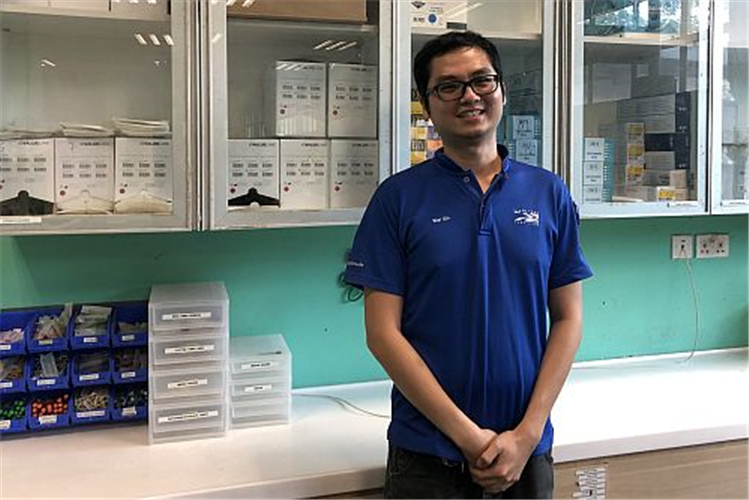Toh first in Asia to obtain Equine Veterinary Nursing Diploma

However little did the Singapore Turf Club staff from its vet department know that it would be remembered as a new milestone.
The 28-year-old Singaporean now has the bragging rights to being the first student in Asia to complete and obtain the City and Guilds Level 3 Diploma in Veterinary Nursing (Equine Pathway) with the UK Equine College, The Open College of Equine Studies (TOCES).
As the diploma is certified by TOCES, an organisation approved by the Royal College of Veterinary Surgeons (RCVS) in providing veterinary nursing training programmes, Toh will join the RCVS's Register of Veterinary Nurses, which is recognised worldwide.
Toh held a Diploma in Veterinary Technology from Temasek Polytechnic before going into National Service. He then took up his first full-time job as a vet assistant at STC in October 2014.
He and 10 other vet assistants were introduced to the three-year part-time Diploma course by STC's vet surgeon, Dr Bronte Forbes, and though a few of them put up their hands for Toh was eventually the only one accepted by TOCES thanks to his background in Veterinary Technology and also having fulfilled the course's pre-requisite of completing 60 weeks of work experience within an approved Training Practice (STC).
However, it was never easy juggling between working full-time and studying part-time since March 2016.
"I was very surprised to be told by Dr Bronte that I'm the first in Asia to get the certification (as a vet nurse)," said Toh, whose first close-up encounter with horses was when he volunteered at a showjumping event in the 2010 Summer Youth Olympics.
"I love animals, but back in Polytechnic, we did not learn much about horses. It was only after I started work at the Club that I knew more about them.
"I would spend two to three hours on average a day, and a few days in a week after work to do e-learning. There were both theory and practical tests, and I also went to UK four times for the course.
"I had to spend one month each for two of the trips to TOCES at Bury St Edmunds in Suffolk for my study, but my colleagues over here were very understanding.
"Once, I also had the chance to go to Rossdales Equine Practice in Newmarket to learn on how to care for new-born sick foals, which you don't get to see in Singapore because we don't breed our own horses.
"The course, as well as the air tickets, was fully sponsored by the Club. I am very thankful for that."
Toh revealed that it took him two tries before he passed the final examination held at TOCES, and he got his certification in March this year. As a vet nurse, he could administer jabs and drugs to the horses, and work more closely with the vet surgeons, including being involved in surgery and the direct medical management of animals.
"As a certified vet nurse, we can give injections and drugs to the horses under the supervision of the vets," said Toh.
"Also, when in the operation theatre, we would wear the surgical attires and assist the vets during the surgeries, which we are not able to do as a vet assistant."
Toh got to put to good use what he learned at an incident involving an exported racehorse in a float towards Tuas Checkpoint on Thursday afternoon.
"The horse kicked and injured his hoof and leg inside the float, so Dr Aileen (Sandosham, vet surgeon) and I went down to give on-site first-aid treatment to him.
"With a deeper understanding of horses' anatomy and how to deal with horses' injuries, I knew what to do and quickly bandaged the horse's leg.
"I think one of the biggest satisfactions of this job is being able to nurse horses back to health and see them return to racing."
Besides playing an integral role in the care of horses, vet nurses also educate people on horse care and managing and developing the equine hospital which leads to a significant improvement in the welfare of horses.
Dr Forbes is proud of Toh's achievement and hopes for greater awareness of the veterinary nursing industry with the Club's support in grooming local talent.
"Vet nurses are like human nurses. They play a vital part in the management of sick and injured horses, and more importantly, in the recovery of horses after injury and ill health," said Dr Forbes.
"The veterinary nursing industry is growing rapidly as people have realised the significant benefits that nurses can give to animal care, and the vocation has developed into a properly regulated and well-educated profession.
"We had two vet nurses from New Zealand previously, but Toh recently became the first local to be recognised by TOCES.
"In Singapore, people are not often exposed to the equine and animal care industries, but as you can see from Toh's case, there are exciting opportunities, and it can be a challenging and rewarding career."



